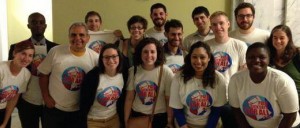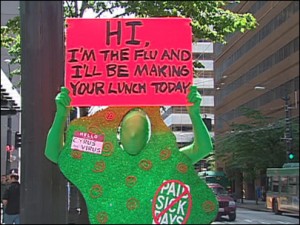Is the Wait Nearly Over for DC Waitstaff on Paid Sick Days?
At the most basic level, it seems like the Jewish question is to ask whether an employer would be satisfied with their workplace policies if they knew those policies would also be applied to their parents, children, or siblings. — Rabbi Elizabeth Richman, rabbi-in-residence, Jews United for Justice
Over the course of DC’s Paid Sick Days campaign, some restaurant owners have complained about the increasingly popular proposal while more have had their provision of paid sick days celebrated by growing numbers of Washingtonians.
When DC passed a 2008 groundbreaking law to allow workers to earn paid sick days after a year of employment, last-minute restaurant industry pressure excluded tipped workers from the legislation. Now, a coalition of groups led by Jews United for Justice, Employment Justice Center, and Restaurant Opportunities Center is working to get cooks, dishwashers, servers, bartenders and bussers access to this basic benefit, which allows them to stop having to choose between their income and their family’s health.
Both a workers rights and a public health issue, the exclusion of tipped workers from DC’s paid sick days law looks like it may not be around much longer. Six months after JUFJ helped make it a defining issue in April’s at-large election, and publicly pressured a local restaurant owner to offer paid sick days, 11 of 13 DC Council members co-sponsored the JUFJ-supported bill, which is expected to have a public hearing later this month. If passed, it will cover tipped restaurant workers, allow workers to start accruing leave earlier, and strengthen penalties for non-compliant employers.

JUFJ
Parties for Paid Sick Days! Jews United for Justice is hosting three house parties next week to help build momentum, expand engagement, and plan actions to help pass the Earned Sick and Safe Leave Amendment Act of 2013. On September 17, the legislation was introduced to the DC Council with 11 cosponsors and is now in committee. A public hearing is expected later this month.
Workers’ rights advocates – with visible Jewish engagement — have mobilized public support for equal benefits for restaurant workers. In San Francisco, the first city to pass a paid sick days law, one of its lead opponents ended up calling it “the best public policy for the least cost.”
Paid sick leave expansions have also passed in Portland, Oregon; Seattle; Jersey City, NJ, and New York City, and are gaining momentum in Connecticut, Tacoma, WA, and Massachusetts. In Massachusetts, the Jewish Alliance for Law and Social Action is a leading force for earned sick time. In New York, Jews for Racial and Economic Justice helped organize activists and rabbis from large and small congregations across the city to pressure City Council Speaker Christine Quinn to stop blocking the legislation from what would become a successful vote.
Polls show that almost 80 percent of DC’s restaurant workers have no access to paid sick days. As a result, about 60 percent report cooking, preparing and serving food while sick. Meanwhile restaurant workers are earning an average of just $22,818 per yea.. The average private-sector employee in DC earns $70,987.
Andy Shallal, owner of DC’s Busboys and Poets, is an outspoken advocate for paid sick days at restaurants. One of the most common questions he gets from other restaurant owners, he says, is whether workers will abuse the policy. “That hasn’t been our experience,” Shallal tells them.
I think about my own job, where I’ve had paid sick days since I started six months ago – but never once used one, because I haven’t been sick. If a business owner is worried about workers using any means possible to get off, perhaps that fear says something about the quality of the work environment itself.
Chef Tate has been running Inspire BBQ in a trendy part of DC for about three years. He says he’s never had a problem with employees taking advantage of the paid sick days he offers. Like a number of other restaurant owners in DC, Chef Tate says he’s offered paid sick days “since day one,” despite not being required to. “It’s a part of our ethics.”
“We say no one works for Inspire BBQ — we all work together,” Tate says. “So if the people you work with are your friends and family, then you’re concerned when they’re sick. Your perspective is you don’t want them to come to work sick not because you don’t want them to get other people sick, but because they’re sick.”
The 13th-century scholar Rabbi Yonah ben Abraham Gerondi would likely agree with Chef Tate’s familial business ethos. In Sefer HaYirah (The Book of Awe), Rabbi Gerondi writes:
Be careful not to afflict a living creature, whether animal or fowl, and even more so not to afflict a human being, who is created in God’s image. If you want to hire workers and you find that they are poor, they should become like poor members of your household. You should not disgrace them; you shall give them their orders respectfully, and should pay their salaries.
“It has fostered a kinship and a careship amongst the staff that is priceless,” Chef Tate says. “One of our staff yesterday was talking about her throat, so when she called out today it wasn’t a big crash because she knew part of our policy was to call someone else who could work her shift. And that person didn’t have a problem because the reciprocal is returned when you’re sick.”
“At the most basic level,” says Rabbi Elizabeth Richman, JUFJ’s rabbi-in-residence, “it seems like the Jewish question is to ask whether an employer would be satisfied with their workplace policies if they knew those policies would also be applied to their parents, children, or siblings.”
Tate sees paid sick days as part of an overall ethic of respecting and supporting his employees that comes back around to benefit customers, the community and even his profit margins.
Restaurant owners opposing paid sick days, he says, will now “realize that the staff will do the things that will help your bottom line more than lying about being sick. They will turn the water off when they finish using the bathroom. They’ll close the refrigerator. If a young person knows that you care about them being hungry, they’ll stop stealing food.”
Not only do healthy employees have higher morale and respect for their employer, but they tend to work harder and accomplish more. Employees working at reduced levels of productivity due to illness — known as “presenteeism” — cost the economy an estimated $160 billion annually, surpassing the cost of absenteeism. A June audit of DC’s 2008 paid sick days law found that it didn’t discourage business owners from basing their businesses in the city or encourage them to move elsewhere. A February study by Public Citizen (where I currently work) found that San Francisco’s paid sick days law was actually followed by a growth in the city’s number of businesses. Seventy percent of the city business owners reported that the law had either no impact or a positive impact on their profitability.
Tate says he’s worked in large hotels where there was an impersonal relationship between the workers and the owners, and has seen what it’s like to work in food service and not be treated well.
Renowned Chef Ethan Stowell, too, once worked for a large company where he says, “everybody looked at their paid sick days as extra vacation days.” Now he owns a group of successful restaurants in Seattle where he has offered paid sick days since before the law.
Stowell says that since he began to offer it, “we haven’t seen much change at all.” Mainly he’s not happy to be losing a competitive hiring edge. He expressed concern that employees would abuse the policy — “call in hungover,” for example — but acknowledged that hasn’t actually happened.
“I think at the larger restaurants where you’re not as personally involved with the owners or investors, you don’t have a personal connection with the owners of a multi-billion dollar company, so you’re taking advantage of somebody that you’re never going to meet.”
Which may drive home a ethic beyond paid sick days: that if you treat your employees well and provide for their health and their ability to take care of their families, they will treat you and your business well in return. And if owners don’t take the initiative to do the right thing, community groups like JUFJ, EJC, ROC DC, JFREJ and JALSA will organize to translate public opinion into new legislation.
“Judaism also recognizes the reality that employers always hold the upper hand,” says Rabbi Richman, “even in situations where there are very good worker-employer relationships. For that reason, Jewish law tends to side with workers and recognize that workers need additional protections.”
Sam Jewler was born and raised in DC and works in communications at Public Citizen. From 2012 to early 2013, he worked at JUFJ. He can be found on Twitter @LuddoftheFuture.
Act Now: Two Things You Can Do in Under Two Minutes
1) Add your name to JUFJ’s petition to help DC restaurant workers.
2) Sign your support for a national law for paid sick days.
![[the current issue of ZEEK]](../../image/2/100/0/5/uploads/leftistethicistgraphic-52842c6a.png)
- 5000 Pages of Zeek
- Founded in 2001, Zeek was the first Jewish online magazine, and we have over 5000 pages online to prove it, all available free of charge. Read more in the Archive.
More articles in


